Zehan Li
Temporal Leakage in Search-Engine Date-Filtered Web Retrieval: A Case Study from Retrospective Forecasting
Jan 31, 2026Abstract:Search-engine date filters are widely used to enforce pre-cutoff retrieval in retrospective evaluations of search-augmented forecasters. We show this approach is unreliable: auditing Google Search with a before: filter, 71% of questions return at least one page containing strong post-cutoff leakage, and for 41%, at least one page directly reveals the answer. Using a large language model (LLM), gpt-oss-120b, to forecast with these leaky documents, we demonstrate an inflated prediction accuracy (Brier score 0.108 vs. 0.242 with leak-free documents). We characterize common leakage mechanisms, including updated articles, related-content modules, unreliable metadata/timestamps, and absence-based signals, and argue that date-restricted search is insufficient for temporal evaluation. We recommend stronger retrieval safeguards or evaluation on frozen, time-stamped web snapshots to ensure credible retrospective forecasting.
From Horizontal Layering to Vertical Integration: A Comparative Study of the AI-Driven Software Development Paradigm
Jan 30, 2026Abstract:This paper examines the organizational implications of Generative AI adoption in software engineering through a multiple-case comparative study. We contrast two development environments: a traditional enterprise (brownfield) and an AI-native startup (greenfield). Our analysis reveals that transitioning from Horizontal Layering (functional specialization) to Vertical Integration (end-to-end ownership) yields 8-fold to 33-fold reductions in resource consumption. We attribute these gains to the emergence of Super Employees, AI-augmented engineers who span traditional role boundaries, and the elimination of inter-functional coordination overhead. Theoretically, we propose Human-AI Collaboration Efficacy as the primary optimization target for engineering organizations, supplanting individual productivity metrics. Our Total Factor Productivity analysis identifies an AI Distortion Effect that diminishes returns to labor scale while amplifying technological leverage. We conclude with managerial strategies for organizational redesign, including the reactivation of idle cognitive bandwidth in senior engineers and the suppression of blind scale expansion.
Simulated Ignorance Fails: A Systematic Study of LLM Behaviors on Forecasting Problems Before Model Knowledge Cutoff
Jan 20, 2026Abstract:Evaluating LLM forecasting capabilities is constrained by a fundamental tension: prospective evaluation offers methodological rigor but prohibitive latency, while retrospective forecasting (RF) -- evaluating on already-resolved events -- faces rapidly shrinking clean evaluation data as SOTA models possess increasingly recent knowledge cutoffs. Simulated Ignorance (SI), prompting models to suppress pre-cutoff knowledge, has emerged as a potential solution. We provide the first systematic test of whether SI can approximate True Ignorance (TI). Across 477 competition-level questions and 9 models, we find that SI fails systematically: (1) cutoff instructions leave a 52% performance gap between SI and TI; (2) chain-of-thought reasoning fails to suppress prior knowledge, even when reasoning traces contain no explicit post-cutoff references; (3) reasoning-optimized models exhibit worse SI fidelity despite superior reasoning trace quality. These findings demonstrate that prompts cannot reliably "rewind" model knowledge. We conclude that RF on pre-cutoff events is methodologically flawed; we recommend against using SI-based retrospective setups to benchmark forecasting capabilities.
A Unified Spoken Language Model with Injected Emotional-Attribution Thinking for Human-like Interaction
Jan 08, 2026Abstract:This paper presents a unified spoken language model for emotional intelligence, enhanced by a novel data construction strategy termed Injected Emotional-Attribution Thinking (IEAT). IEAT incorporates user emotional states and their underlying causes into the model's internal reasoning process, enabling emotion-aware reasoning to be internalized rather than treated as explicit supervision. The model is trained with a two-stage progressive strategy. The first stage performs speech-text alignment and emotional attribute modeling via self-distillation, while the second stage conducts end-to-end cross-modal joint optimization to ensure consistency between textual and spoken emotional expressions. Experiments on the Human-like Spoken Dialogue Systems Challenge (HumDial) Emotional Intelligence benchmark demonstrate that the proposed approach achieves top-ranked performance across emotional trajectory modeling, emotional reasoning, and empathetic response generation under both LLM-based and human evaluations.
TELEVAL: A Dynamic Benchmark Designed for Spoken Language Models in Chinese Interactive Scenarios
Jul 24, 2025Abstract:Spoken language models (SLMs) have seen rapid progress in recent years, along with the development of numerous benchmarks for evaluating their performance. However, most existing benchmarks primarily focus on evaluating whether SLMs can perform complex tasks comparable to those tackled by large language models (LLMs), often failing to align with how users naturally interact in real-world conversational scenarios. In this paper, we propose TELEVAL, a dynamic benchmark specifically designed to evaluate SLMs' effectiveness as conversational agents in realistic Chinese interactive settings. TELEVAL defines three evaluation dimensions: Explicit Semantics, Paralinguistic and Implicit Semantics, and System Abilities. It adopts a dialogue format consistent with real-world usage and evaluates text and audio outputs separately. TELEVAL particularly focuses on the model's ability to extract implicit cues from user speech and respond appropriately without additional instructions. Our experiments demonstrate that despite recent progress, existing SLMs still have considerable room for improvement in natural conversational tasks. We hope that TELEVAL can serve as a user-centered evaluation framework that directly reflects the user experience and contributes to the development of more capable dialogue-oriented SLMs.
BoSS: Beyond-Semantic Speech
Jul 23, 2025Abstract:Human communication involves more than explicit semantics, with implicit signals and contextual cues playing a critical role in shaping meaning. However, modern speech technologies, such as Automatic Speech Recognition (ASR) and Text-to-Speech (TTS) often fail to capture these beyond-semantic dimensions. To better characterize and benchmark the progression of speech intelligence, we introduce Spoken Interaction System Capability Levels (L1-L5), a hierarchical framework illustrated the evolution of spoken dialogue systems from basic command recognition to human-like social interaction. To support these advanced capabilities, we propose Beyond-Semantic Speech (BoSS), which refers to the set of information in speech communication that encompasses but transcends explicit semantics. It conveys emotions, contexts, and modifies or extends meanings through multidimensional features such as affective cues, contextual dynamics, and implicit semantics, thereby enhancing the understanding of communicative intentions and scenarios. We present a formalized framework for BoSS, leveraging cognitive relevance theories and machine learning models to analyze temporal and contextual speech dynamics. We evaluate BoSS-related attributes across five different dimensions, reveals that current spoken language models (SLMs) are hard to fully interpret beyond-semantic signals. These findings highlight the need for advancing BoSS research to enable richer, more context-aware human-machine communication.
Multi-Label Classification with Generative AI Models in Healthcare: A Case Study of Suicidality and Risk Factors
Jul 22, 2025
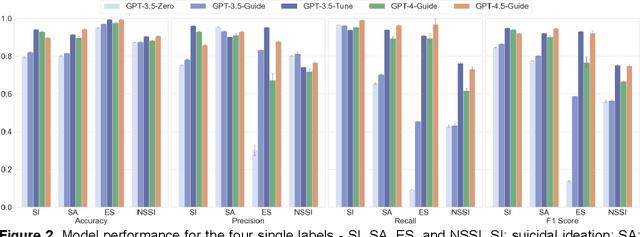
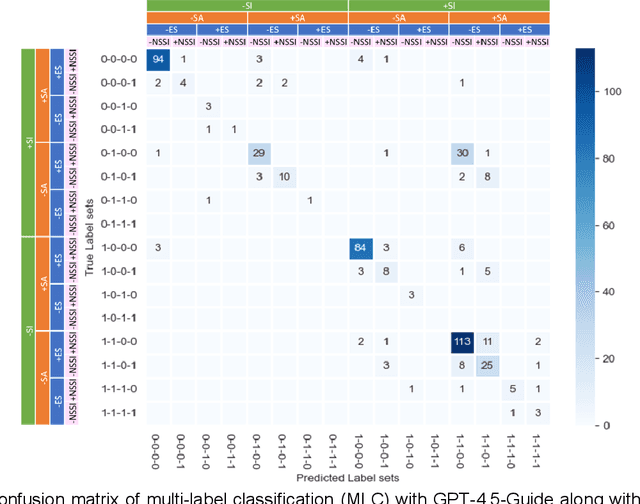
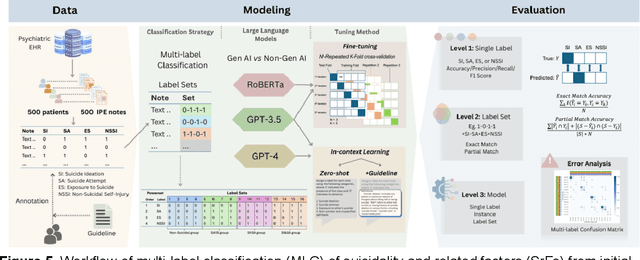
Abstract:Suicide remains a pressing global health crisis, with over 720,000 deaths annually and millions more affected by suicide ideation (SI) and suicide attempts (SA). Early identification of suicidality-related factors (SrFs), including SI, SA, exposure to suicide (ES), and non-suicidal self-injury (NSSI), is critical for timely intervention. While prior studies have applied AI to detect SrFs in clinical notes, most treat suicidality as a binary classification task, overlooking the complexity of cooccurring risk factors. This study explores the use of generative large language models (LLMs), specifically GPT-3.5 and GPT-4.5, for multi-label classification (MLC) of SrFs from psychiatric electronic health records (EHRs). We present a novel end to end generative MLC pipeline and introduce advanced evaluation methods, including label set level metrics and a multilabel confusion matrix for error analysis. Finetuned GPT-3.5 achieved top performance with 0.94 partial match accuracy and 0.91 F1 score, while GPT-4.5 with guided prompting showed superior performance across label sets, including rare or minority label sets, indicating a more balanced and robust performance. Our findings reveal systematic error patterns, such as the conflation of SI and SA, and highlight the models tendency toward cautious over labeling. This work not only demonstrates the feasibility of using generative AI for complex clinical classification tasks but also provides a blueprint for structuring unstructured EHR data to support large scale clinical research and evidence based medicine.
MiniMax-M1: Scaling Test-Time Compute Efficiently with Lightning Attention
Jun 16, 2025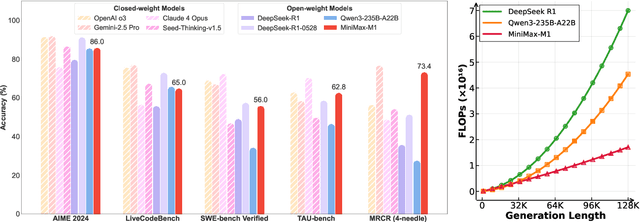

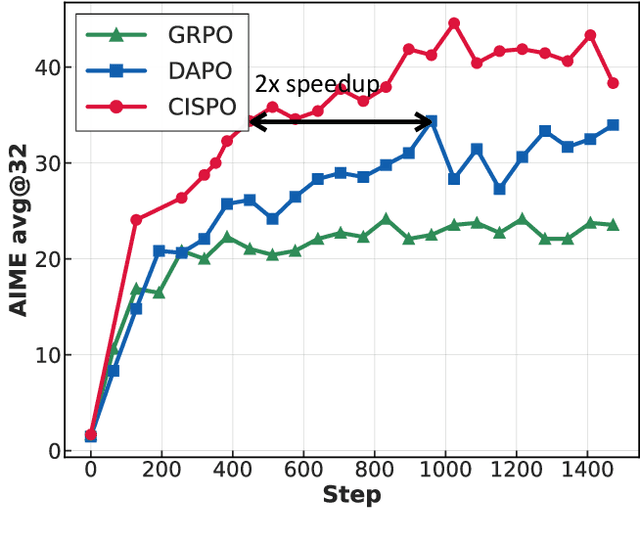
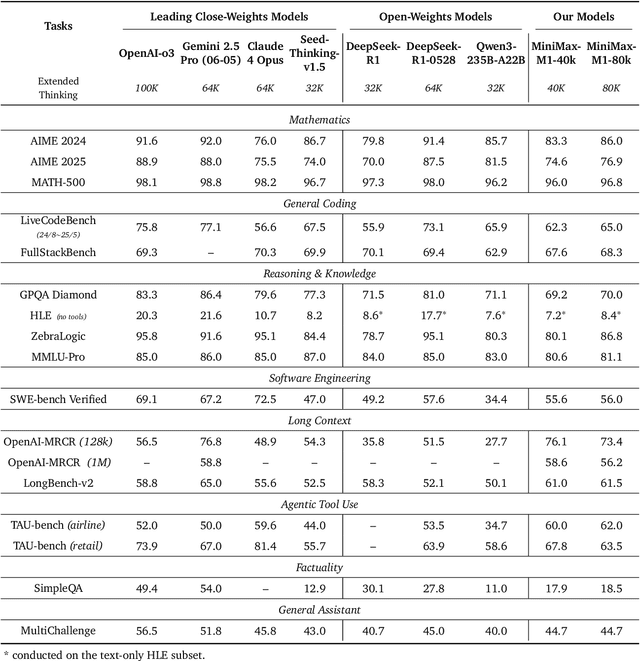
Abstract:We introduce MiniMax-M1, the world's first open-weight, large-scale hybrid-attention reasoning model. MiniMax-M1 is powered by a hybrid Mixture-of-Experts (MoE) architecture combined with a lightning attention mechanism. The model is developed based on our previous MiniMax-Text-01 model, which contains a total of 456 billion parameters with 45.9 billion parameters activated per token. The M1 model natively supports a context length of 1 million tokens, 8x the context size of DeepSeek R1. Furthermore, the lightning attention mechanism in MiniMax-M1 enables efficient scaling of test-time compute. These properties make M1 particularly suitable for complex tasks that require processing long inputs and thinking extensively. MiniMax-M1 is trained using large-scale reinforcement learning (RL) on diverse problems including sandbox-based, real-world software engineering environments. In addition to M1's inherent efficiency advantage for RL training, we propose CISPO, a novel RL algorithm to further enhance RL efficiency. CISPO clips importance sampling weights rather than token updates, outperforming other competitive RL variants. Combining hybrid-attention and CISPO enables MiniMax-M1's full RL training on 512 H800 GPUs to complete in only three weeks, with a rental cost of just $534,700. We release two versions of MiniMax-M1 models with 40K and 80K thinking budgets respectively, where the 40K model represents an intermediate phase of the 80K training. Experiments on standard benchmarks show that our models are comparable or superior to strong open-weight models such as the original DeepSeek-R1 and Qwen3-235B, with particular strengths in complex software engineering, tool utilization, and long-context tasks. We publicly release MiniMax-M1 at https://github.com/MiniMax-AI/MiniMax-M1.
Tales of the 2025 Los Angeles Fire: Hotwash for Public Health Concerns in Reddit via LLM-Enhanced Topic Modeling
May 14, 2025Abstract:Wildfires have become increasingly frequent, irregular, and severe in recent years. Understanding how affected populations perceive and respond during wildfire crises is critical for timely and empathetic disaster response. Social media platforms offer a crowd-sourced channel to capture evolving public discourse, providing hyperlocal information and insight into public sentiment. This study analyzes Reddit discourse during the 2025 Los Angeles wildfires, spanning from the onset of the disaster to full containment. We collect 385 posts and 114,879 comments related to the Palisades and Eaton fires. We adopt topic modeling methods to identify the latent topics, enhanced by large language models (LLMs) and human-in-the-loop (HITL) refinement. Furthermore, we develop a hierarchical framework to categorize latent topics, consisting of two main categories, Situational Awareness (SA) and Crisis Narratives (CN). The volume of SA category closely aligns with real-world fire progressions, peaking within the first 2-5 days as the fires reach the maximum extent. The most frequent co-occurring category set of public health and safety, loss and damage, and emergency resources expands on a wide range of health-related latent topics, including environmental health, occupational health, and one health. Grief signals and mental health risks consistently accounted for 60 percentage and 40 percentage of CN instances, respectively, with the highest total volume occurring at night. This study contributes the first annotated social media dataset on the 2025 LA fires, and introduces a scalable multi-layer framework that leverages topic modeling for crisis discourse analysis. By identifying persistent public health concerns, our results can inform more empathetic and adaptive strategies for disaster response, public health communication, and future research in comparable climate-related disaster events.
GOAT-TTS: LLM-based Text-To-Speech Generation Optimized via A Dual-Branch Architecture
Apr 15, 2025Abstract:While large language models (LLMs) have revolutionized text-to-speech (TTS) synthesis through discrete tokenization paradigms, current architectures exhibit fundamental tensions between three critical dimensions: 1) irreversible loss of acoustic characteristics caused by quantization of speech prompts; 2) stringent dependence on precisely aligned prompt speech-text pairs that limit real-world deployment; and 3) catastrophic forgetting of the LLM's native text comprehension during optimization for speech token generation. To address these challenges, we propose an LLM-based text-to-speech Generation approach Optimized via a novel dual-branch ArchiTecture (GOAT-TTS). Our framework introduces two key innovations: (1) The modality-alignment branch combines a speech encoder and projector to capture continuous acoustic embeddings, enabling bidirectional correlation between paralinguistic features (language, timbre, emotion) and semantic text representations without transcript dependency; (2) The speech-generation branch employs modular fine-tuning on top-k layers of an LLM for speech token prediction while freezing the bottom-k layers to preserve foundational linguistic knowledge. Moreover, multi-token prediction is introduced to support real-time streaming TTS synthesis. Experimental results demonstrate that our GOAT-TTS achieves performance comparable to state-of-the-art TTS models while validating the efficacy of synthesized dialect speech data.
 Add to Chrome
Add to Chrome Add to Firefox
Add to Firefox Add to Edge
Add to Edge